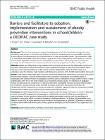| dc.contributor.author | Hayes, Catherine | en |
| dc.date.accessioned | 2020-07-24T15:34:52Z | |
| dc.date.available | 2020-07-24T15:34:52Z | |
| dc.date.issued | 2019 | en |
| dc.date.submitted | 2019 | en |
| dc.identifier.citation | Hayes CB, O'Shea MP, Foley-Nolan C, McCarthy M, Harrington J., Barriers and facilitators to adoption, implementation and sustainment of obesity prevention interventions in schoolchildren - a DEDIPAC case study, BMC Public Health, 19, 198, 2019 | en |
| dc.identifier.other | Y | en |
| dc.identifier.uri | https://bmcpublichealth.biomedcentral.com/articles/10.1186/s12889-018-6368-7 | |
| dc.identifier.uri | http://hdl.handle.net/2262/93035 | |
| dc.description | PUBLISHED | en |
| dc.description.abstract | Background:
The aim of the study was to explore the implementation of school based diet and physical activity interventions with respect to the barriers and facilitators to adoption, implementation and sustainability; supportive actions required for implementation and recommendations to overcome identified barriers. Two interventions rolled out nationally in Ireland were chosen; Food Dudes, a programme to encourage primary school children to consume more fruit and vegetables and Green Schools Travel (GST), an active travel to school programme in primary and secondary schools. Trained school coordinators (teachers) cascade the programmes to other teaching staff.
Methods:
Multiple case study design using qualitative semi-structured interviews with key stakeholders: primary and secondary school teachers, school coordinators, project coordinators/managers, funders and intermediaries. Fifteen interviews were conducted. Data were coded using a common categorization matrix. Thematic analysis was undertaken using the Adoption, Implementation and Maintenance elements of the RE-AIM implementation framework.
Results:
Good working relationships within and across government departments, intermediaries and schools were critical for intervention adoption, successful implementation and sustainability. Organisational and leadership ability of coordinators were essential. Provision of participation incentives acted as motivators to engage children’s interest. A deep understanding of the lives of the target children was an important contextual factor. The importance of adaptation without compromising core components in enhancing intervention sustainability emerged. Successful implementation was hindered by: funding insecurity, school timetable constraints, broad rather than specific intervention core components, and lack of agreement on conduct of programme evaluation. Supportive actions for maintenance included ongoing political support, secure funding and pre-existing healthy lifestyle policies.
Conclusions:
Successful implementation and scale up of public health anti-obesity interventions in schools is dependent on good contextual fit, engagement and leadership at multiple levels and secure funding. Recommendations to overcome barriers include: capacity to deliver within an already overcrowded curriculum and clear specification of intervention components within a conceptual framework to facilitate evaluation. Our findings are generalisable across different contexts and are highly relevant to those involved in the development or adaptation, organisation or execution of national public health interventions: policy makers, guidelines developers, and staff involved in local organisation and delivery. | en |
| dc.language.iso | en | en |
| dc.relation.ispartofseries | BMC Public Health | en |
| dc.relation.ispartofseries | 19 | en |
| dc.relation.ispartofseries | 198 | en |
| dc.rights | Y | en |
| dc.subject | Implementation | en |
| dc.subject | Facilitators | en |
| dc.subject | School-based | en |
| dc.subject | Obesity prevention | en |
| dc.title | Barriers and facilitators to adoption, implementation and sustainment of obesity prevention interventions in schoolchildren - a DEDIPAC case study | en |
| dc.type | Journal Article | en |
| dc.contributor.sponsor | Health Research Board (HRB) | en |
| dc.type.supercollection | scholarly_publications | en |
| dc.type.supercollection | refereed_publications | en |
| dc.identifier.peoplefinderurl | http://people.tcd.ie/hayesc9 | en |
| dc.identifier.rssinternalid | 195306 | en |
| dc.identifier.doi | http://dx.doi.org/10.1186/s12889-018-6368-7 | en |
| dc.rights.ecaccessrights | openAccess | |
| dc.contributor.sponsorGrantNumber | DEDIPAC/2013/1. Award Number 12648. | en |
| dc.subject.TCDTheme | Inclusive Society | en |
| dc.subject.TCDTheme | Making Ireland | en |
| dc.identifier.orcid_id | 0000-0002-1576-4623 | en |
| dc.subject.darat_impairment | Chronic Health Condition | en |
| dc.subject.darat_thematic | Children | en |
| dc.subject.darat_thematic | Health | en |
| dc.subject.darat_thematic | Social exclusion | en |
| dc.status.accessible | N | en |




